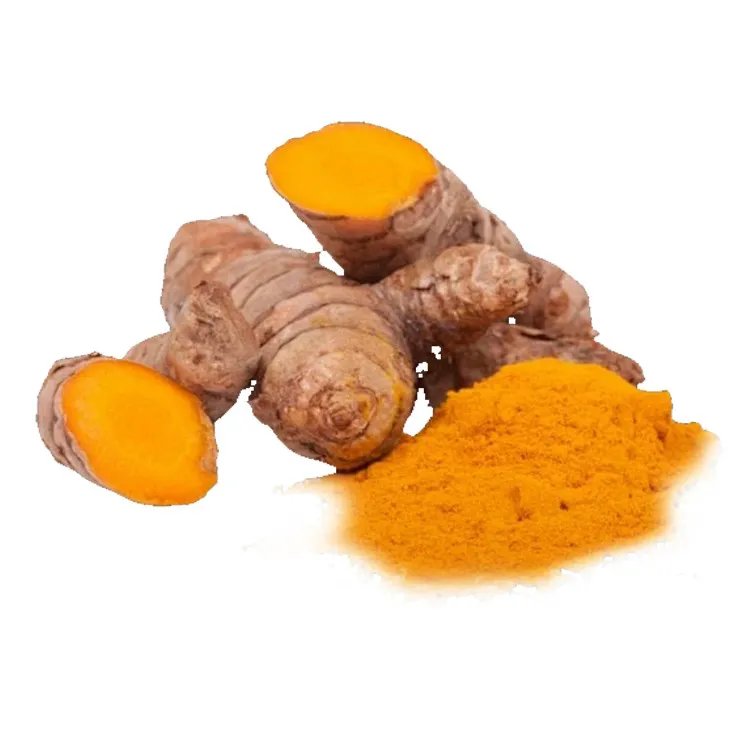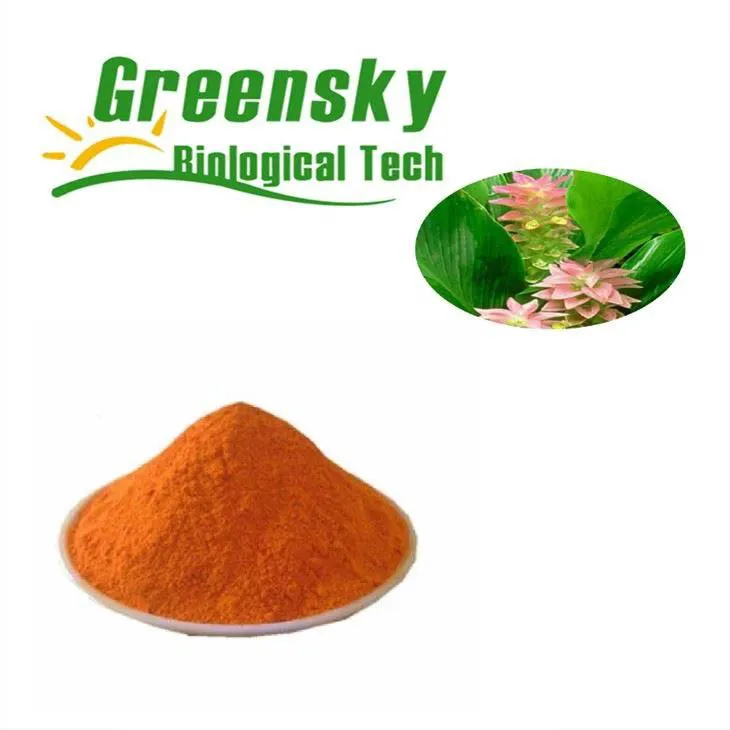- 0086-571-85302990
- sales@greenskybio.com
Is Curcumin the Same as Turmeric?
2025-07-14

In recent years, both Curcumin and turmeric have gained widespread attention in the health and wellness communities for their potential medicinal benefits. This surge in popularity has, however, led to some confusion about the distinction between the two. Though often used interchangeably, Curcumin and turmeric are not the same; understanding their differences can help consumers make informed decisions about their use.
Turmeric: A Versatile Spice with Ancient Roots
Turmeric is a plant scientifically known as Curcuma longa, belonging to the ginger family. Historically, it has been cultivated for thousands of years, originating in the Indian subcontinent and Southeast Asia. Turmeric is renowned for its vibrant yellow-orange color and has been a staple in Asian cooking, contributing flavor and color to a variety of dishes, particularly curries.
Beyond its culinary uses, turmeric has also been utilized in traditional medicine systems like Ayurveda and Traditional Chinese Medicine for its purported healing properties. These traditional applications have included using turmeric as an anti-inflammatory agent, a remedy for digestive issues, and even a natural coloring agent in fabrics and cosmetics.

Curcumin: The Active Compound in Turmeric
While turmeric used in cooking and traditional medicine is derived from the dried and powdered root of the plant, curcumin is one of the primary bioactive components found within turmeric. Curcumin comprises around 2-8% of most turmeric preparations and is the compound largely responsible for the spice's yellow hue.
Curcumin is celebrated for its potent antioxidant and anti-inflammatory properties. Researchers have extensively studied curcumin for its potential therapeutic effects on a wide range of conditions, from arthritis and cardiovascular diseases to neurodegenerative disorders and various types of cancer. It is this compound that often piques the interest of both the scientific community and consumers seeking natural remedies.

Scientific Studies and Health Benefits
The appeal of curcumin lies in its ability to modulate inflammatory pathways and neutralize free radicals, which are unstable molecules that can cause cellular damage. This antioxidant property is crucial in combating oxidative stress, which is implicated in the aging process and the pathogenesis of numerous chronic diseases.
Scientific studies over the last few decades have consistently demonstrated curcumin's potential health benefits. For instance, in the realm of cardiovascular health, curcumin has been shown to improve endothelial function, which is vital for heart health. Furthermore, its anti-inflammatory properties are particularly beneficial for individuals suffering from arthritis. Several human studies have shown that curcumin supplements can significantly reduce symptoms of arthritis and may be more effective than some anti-inflammatory drugs.
In terms of cancer research, curcumin has shown promise in affecting cancer growth and development. Studies suggest that it can reduce angiogenesis (the growth of new blood vessels in tumors), metastasis (spread of cancer), and contribute to the apoptosis (death) of cancerous cells.

Bioavailability Challenges
Despite its potent benefits, one of the challenges with curcumin is its bioavailability. Bioavailability refers to the degree and rate at which a substance is absorbed into the bloodstream. Curcumin, when consumed alone, exhibits poor absorption, rapid metabolism, and quick elimination from the body.
To counteract this issue, researchers have explored various formulation strategies to enhance curcuma’s bioavailability. Combining curcumin with piperine, found in black pepper, can enhance absorption by 2000%. Other approaches include using phospholipid complexes or nanoparticles to improve its solubility and absorption in the body.

Turmeric as a Whole Food Source
While curcumin has been isolated and studied intensively, it is important not to overlook the potential benefits of consuming turmeric in its whole form. Turmeric contains other curcuminoids and essential oils that may work synergistically with curcumin, potentially enhancing its efficacy. Many advocates of whole-food nutrition emphasize consuming turmeric in its natural state—through cooking or adding it to beverages—for its holistic benefits.

Practical Applications and Considerations
For those considering adding turmeric or curcumin supplements to their regimen, it is crucial to take a few factors into account. Individuals should consult with healthcare providers, especially if they have underlying health conditions or are taking medications, as curcumin can interact with certain drugs, such as blood thinners.
Choosing high-quality supplements from reputable sources is also imperative to ensure efficacy and safety. Consumers should look for products that have been third-party tested and standardized for curcumin content.
Conclusion
In conclusion, while curcumin and turmeric are related, they are distinct entities with unique properties and benefits. Turmeric is a versatile spice that offers a range of health advantages, and curcumin is the potent compound driving many of these benefits. Understanding the differences between the two—and the science behind them—can empower individuals to make informed choices about their health and wellness. Whether incorporating turmeric into your diet or exploring curcumin supplements, these traditional remedies continue to illuminate the path of natural therapeutic options in the modern world.
- ▶ Hesperidin
- ▶ citrus bioflavonoids
- ▶ plant extract
- ▶ lycopene
- ▶ Diosmin
- ▶ Grape seed extract
- ▶ Sea buckthorn Juice Powder
- ▶ Beetroot powder
- ▶ Hops Extract
- ▶ Artichoke Extract
- ▶ Reishi mushroom extract
- ▶ Astaxanthin
- ▶ Green Tea Extract
- ▶ Curcumin Extract
- ▶ Horse Chestnut Extract
- ▶ Other Problems
- ▶ Boswellia Serrata Extract
- ▶ Resveratrol Extract
- ▶ Marigold Extract
- ▶ Grape Leaf Extract
- ▶ blog3
- ▶ Aminolevulinic acid
- ▶ Cranberry Extract
- ▶ Red Yeast Rice
- ▶ Red Wine Extract
-
Black Pepper Extract
2025-07-14
-
White Peony Extract
2025-07-14
-
Apricot Powder
2025-07-14
-
Shikone Extract
2025-07-14
-
Mulberry Extract
2025-07-14
-
Ginger Extract
2025-07-14
-
Garcinia Cambogia Extract
2025-07-14
-
Gynostemma pentaphyllum extract
2025-07-14
-
Marigold Extract
2025-07-14
-
Purple Sweet Potato Extract
2025-07-14





















